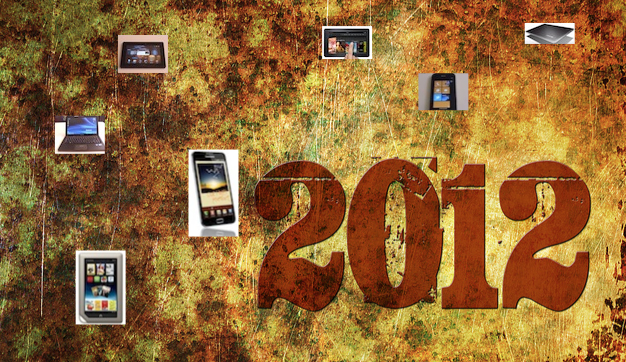2012 Mobile state of the union: Part 2 of 3: Tablets


The rapidly changing mobile space
The mobile space moves at breakneck speed, especially the last few years. We have seen the cell phone go from an expensive business tool to a gadget that is owned by most people. The giant brick mobile phone evolved into the thin slice of today's smartphone. Never in history have so many of the world's population held so much computing power in their hands, and the precense of social networks brings world events to our pockets.
In the last decade we have seen the birth of the tablet, and watched it transform from a heavy slab to the thin slate of today. Millions have discovered that a tablet, a mobile device can fill almost all their computing needs, and many believe a post-PC era has begun.
Over the same ten years the laptop has become the main computer for many consumers and the enterprise, as the convenience of a computing system in one piece at an attractive price beats the old school system of multiple components all wired together. The laptop has changed from a giant, heavy, heat generator with poor battery life to a thin, highly portable form with the ability to run nearly all day on a single charge.
Turning our eyes to the mobile space in 2012, we will see a continuing evolution in all three of these mobile sectors. Rather than earthshaking breakthroughs in mobile technology, importantly we will see the mobile device play an increasing more significant role in society. More folks will continue to tap into the global community than ever before, and mobile technology will be the tool that brings more of the world together.
Tablets
In 2012 Apple will continue to dominate the tablet space with the iPad, and should release the next model. The iPad 3, as it will likely be named, should be similar to the iPad 2 with upgrades mostly under the hood. It's not likely Apple can go much thinner and lighter than the iPad 2, so expect processor bumps and software changes. Don't be surprised if we see a 4G-capable iPad, as Apple may test the waters on the tablet first before bringing it to the iPhone with its smaller battery. Where Apple might take a swipe at the competition is with pricing. Even a modest price drop of $50 could shake things up in the tablet world, a bigger drop would make things quite interesting.
The number two contender in the tablet space next year will be none other than the Kindle Fire from Amazon. While technically an Android tablet, the Amazon fork has its own look and feel and ecosystem to back it up. Amazon sold a million Kindle Fires prior to actually shipping one, and should have a second million in sales through the 2011 holiday season. Next year don't be surprised if Amazon notes another 6 million+ sales in the books, making it easily the number two tablet behind the iPad. While rumors claim we will see a bigger (8.9-inch) tablet next year, I don't think that will be the case. The $199 price of the Kindle Fire is important, and a more expensive tablet would be risky.
We should see Android 4.0, aka Ice Cream Sandwich, shipping on tablets in numbers next year. While the demonstrations I have seen of ICS running on tablets aren't revolutionary, it is better than Honeycomb so OEMs should flock to get their tablets to market. Pricing will get quite competitive, which actually hurts Android as a platform as they don't seem to compete with the iPad, rather with each other. We will see quad core processors powering Android tablets next year, making them some of the fastest mobile computers around. There doesn't seem to be one single champion in the Android camp coming to dominate the rest.
Next year will be Microsoft's springboard to try and claim a piece of the tablet pie, as Windows 8 starts to hit in the latter half of the year. We should see both Intel and ARM-based tablets come to market, with the former targeting the enterprise and the latter the consumer. Microsoft has bitten off a big task in using its flagship desktop OS to also power the tablet, and it will be interesting to see how consumers react. There is a draw to have your tablet work like your main computer, and use the same apps, so we'll see how big a splash Windows 8 makes in the tablet sector.
The Nook Tablet was released nearly simultaneously with the Kindle Fire, but lacks the ecosystem and retail smarts Amazon brings to the Kindle Fire. The techie crowd will jump on the Nook Tablet due to its hackability, but I believe regular consumers will go with the familiar Amazon Kindle brand next year.
Tablets will continue to sell well in 2012, as more consumers realize they can do a significant portion of the computing they do at home on the slate. The larger screen is better suited for most of these activities than the tiny smartphone, and as prices continue to drop sales will continue on the up-swing. The cheap Kindle Fire will expose millions to the benefits of the tablet in general, and that might translate into new customers for the other platforms.
Yesterday: 2012 Mobile state of the union: Part 1 of 3: Smartphones
Tomorrow: 2012 Mobile state of the union: Part 3 of 3: Notebooks
Image credit: Flickr user stockerre
See also:
- 2012: Year of the Ultrabook
- TechRepublic: Android 4.0: Eight new features that actually matter
- CNET Asia’s review of Samsung Galaxy Nexus and top five features
- CNET’s first impressions
- Android developers blog
- Top 10 features in Android 4.0 (Ice Cream Sandwich)
- Android 4.0 Ice Cream Sandwich is enchanting, easy, and makes you feel special
- Unwrapping Google Ice Cream Sandwich 4.0 (photos)